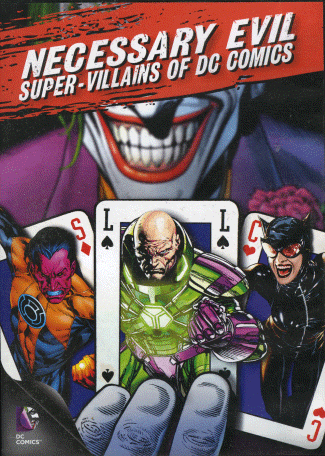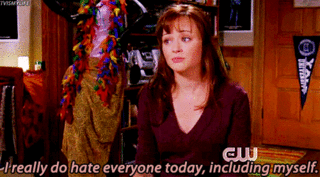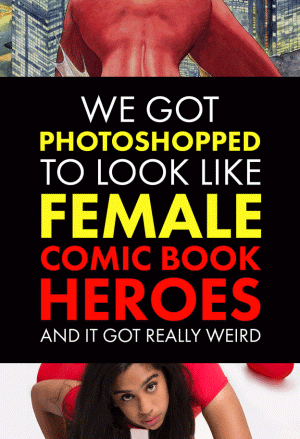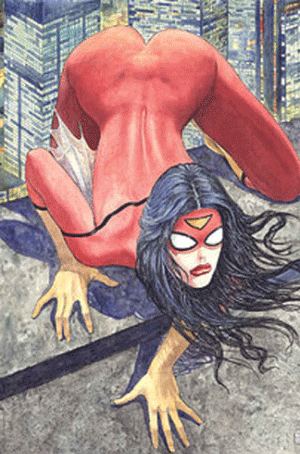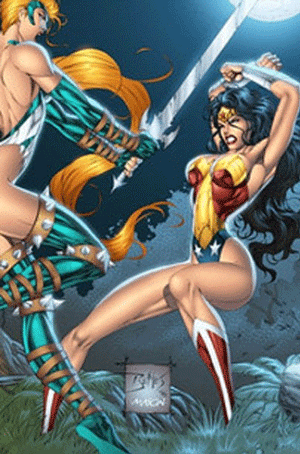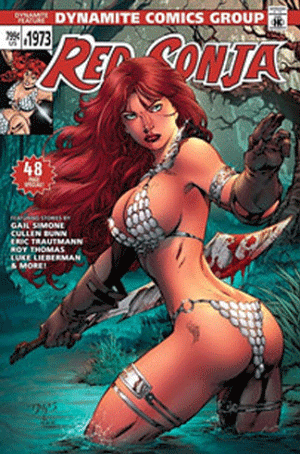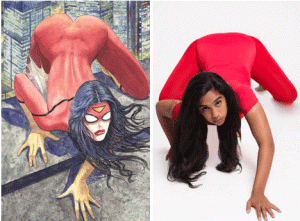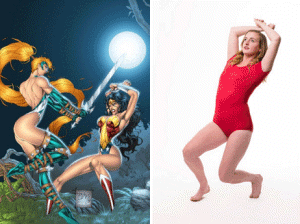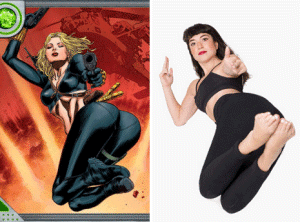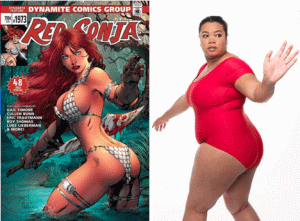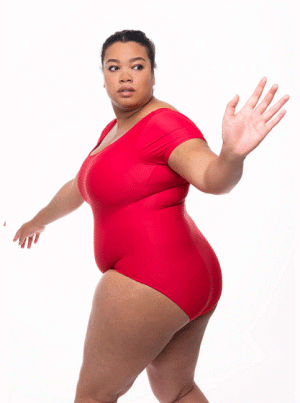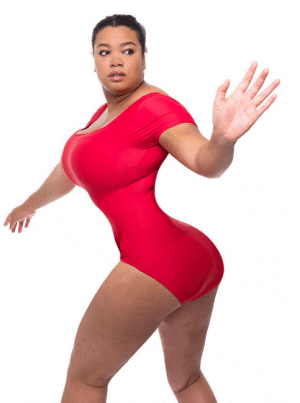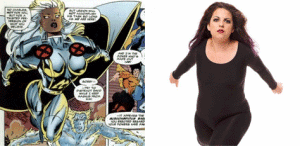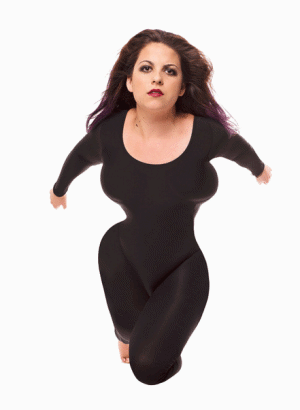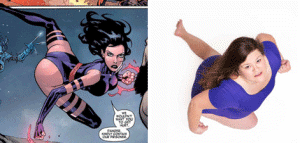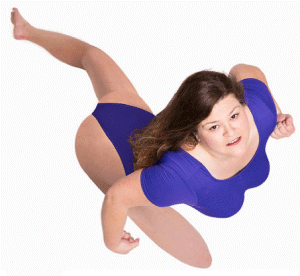PART 3 OF 5
He's "What if Aquaman went down a different path?"
In the case of Flash, it's Reverse-Flash.
Literally, it's a reverse version of the Flash, a mirror of him.
And then the opposite would be Captain Cold.
Because, on first blush you're like, "Oh, it's ice. So what, he slips?"
And you look at Captain Cold, and you analyze him a little bit more.
When they introduced him, he was called "The Man Who Mastered Absolute Zero."
And absolute zero means zero atomic motion.
That means the atoms do not move.
You know, when things are colder, they're slower on the atomic level.
So that's why Captain Cold, to me, always captured ...
the essence of an opposite of the Flash.
Nihilism is the belief that all values are baseless and that nothing can be known or communicated. It is often associated with extreme pessimism and a radical skepticism that condemns existence. A true nihilist would believe in nothing, have no loyalties, and no purpose other than, perhaps, an impulse to destroy. While few philosophers would claim to be nihilists, nihilism is most often associated with Friedrich Nietzsche who argued that its corrosive effects would eventually destroy all moral, religious, and metaphysical convictions and precipitate the greatest crisis in human history. In the 20th century, nihilistic themes--epistemological failure, value destruction, and cosmic purposelessness--have preoccupied artists, social critics, and philosophers. Mid-century, for example, the existentialists helped popularize tenets of nihilism in their attempts to blunt its destructive potential. By the end of the century, existential despair as a response to nihilism gave way to an attitude of indifference, often associated with antifoundationalism.
--
Nihilism, by Alan Pratt, Ph.D.
[Paul Dini, Producer of Batman: The Animated Series] When you look at somebody like Batman, ...
Catwoman is certainly the sexual challenge to him.
Riddler is the intellectual challenge.
Penguin is almost a mockery of what Bruce Wayne is on the social scene.
And the Joker is the horrific version of what Batman is to ordinary people.
Whereas Batman scares criminals, the Joker scares and horrifies the ordinary people.
[Mike Carlin, Creative Director of Animation, DC Entertainment]
Black Adam is another good opposite number character. He's kind of got a costume that's similar to Shazam's costume, but it's black.
He's also another member of a police force that has kind of fallen from grace, ...
the Wizards' Protector Society, which is what Shazam is, and what Black Adam was.
[Geoff Johns, Chief Creative Officer of DC Entertainment] The Crime Syndicate characters that have been around for decades, ...
they come from a version,a parallel Earth, a version of our Earth ...
where everyone who's good is bad, and everyone who is bad is good.
And so you've got an evil Superman in Ultraman.
Then you have Owlman, who is a dark version of Batman.
And Superwoman, who is a dark version of Wonder Woman.
You have Johnny Quick and Power Ring. Power Ring is this twisted Green Lantern ...
who's a coward.
The Crime Syndicate represent the Justice League completely flipped on its head, ...
and if they were horrible, horrible, evil people.
[James Robinson, Writer of "Earth 2"] In terms of what they can accomplish, and who they can defeat, ...
they're on a par with the Justice League. But their goals are so perverted, ...
compared to the honor and the morality that the Justice League have.
[Villain] Which leaves the governments of the world with two choices: bow down to us or die.
[Geoff Johns, Chief Creative Officer of DC Entertainment] The best supervillains that resonate the most, they do it on two levels.
They do it, how they psychologically reflect or challenge your superhero, ...
and then also, in the story, what they've done to affect the superhero's life.
[Jim Lee, Co-Publisher of DC Entertainment] If there is not that personal connection, it just weakens it.
It just becomes another person trying to do something dastardly.
[Claudia Black, "Cheetah-Justice League: Doom] When they are really well-paired, the villain's been able to get inside the superhero's head.
It's almost as if he knows precisely what makes them vulnerable, what their greatest fear is.
[Kevin Shinick, Writer/Co-Producer of Robot Chicken: DC Comics Special] When they make it personal, and when they can make it personal, ...
when the villains have the knowledge to make it personal, and know your inner secrets, ...
that's when things get real.
The experts further claim that comic books are an aid for children in their general adaptation to life and, as one of them puts it, can serve as "mechanisms for personal experimentation with reality." It is not clear how children are supposed to do this. Are they supposed to play the hunters or the hunted? The torturers or the tortured? The rapers or the raped? Are they to fantasy that they stab wild animals or girls in the eye or that wild animals will come to their aid when they need help? Where does the reality of life come in? Adaptation to the reality of life consists in learning to use one's faculties for something constructive, to make an effort to apply oneself, to seek guidance from those who know better, to respect the rights and wishes of others, to learn self-discipline. The reality of life may consist in a struggle, but that does not mean a continual violent physical fight between those who are not allowed to kill and those who are permitted to kill.
--
Seduction of the Innocent, by Fredric Wertham, M.D.
[Andrea Romano, Voice Director of DC Animated Titles] Talia al Ghul, she fell in love with Batman.
And so when it comes to the point of killing Batman, ...
many times, in many stories, she draws the line there.
She will not kill him. She wants him for her own.
[Michael E. Uslan, Executive Producer of The Dark Knight Rises] Star Sapphire was not only Hal Jordan's boss, but also girlfriend.
And when she was manipulated, ...
she did not know consciously that she had become Star Sapphire.
Then you've got this interesting dynamic ...
of when he ultimately finds out that this is his girlfriend, and he's got to battle her, ...
and how does he battle her when she's so smart without hurting her?
[Andrea Romano, Voice Director of DC Animated Titles] That kind of conflict, of people who were once friends and become enemies, ...
you know, it's almost like the Greek tragedies, these enormous stories of betrayal.
Dr. George E. Reed, director of a large psychiatric hospital affiliated with McGill University, in a paper read before the American Psychiatric Association, reported on a study of the effect of comic books on normal children from seven to fourteen. He proceeded in a strictly scientific manner, using among other procedures a "game technique." He determined the latent as well as manifest meaning of the pictures to the child. It is noteworthy that his observations were made before crime comics came to full bloom in the blood-and-bra formula. In contrast to the experts for the defense, Dr. Reed said what the comic books are about: "Violence is the continuous theme, not only violence to others but in the impossible accomplishments of the heroes, heroines and animals." He found undue stress on superdevelopment of hero and heroine: "... any variation from this 'norm' is the subject of suspicion, ridicule or pity." He noted that "distorted educational data are common"; that "direct action" by the hero is "superior to the dumb and incompetent police"; that race hatred is taught: "... foreigners are all criminals"; that "scantily clad females [are] man-handled or held in a position of opisthotonos [exaggerated intercourse-like position]." It was his opinion that juvenile delinquency is in part dependent on environment and that "comic books are of increasing importance as a part of children's environment." With regard to sexual development he drew this important conclusion: "The repeated visualization of women being treated violently by men can do nothing but instill an ambivalent emotional attitude in the child toward heterosexual contacts." In other words, he pointed to a profound disturbance of normal psychosexual development of children through the medium of comic books. As a result of his studies he regarded it as "fallacious" to consider comic books as a substitute for mythology or folklore, or to regard them as a normal emotional outlet for normal children. In vain will you look for any mention of this carefully weighed psychiatric report in any of the writings of the team-experts professing to express both sides and enlighten the public.
--
Seduction of the Innocent, by Fredric Wertham, M.D.
[Geoff Johns, Chief Creative Officer of DC Entertainment] I just ended my run with Green Lantern 20.
And as I was wrapping it up, the story kind of organically revolved around not only Hal, ...
but Hal and Sinestro. And that relationship is really key to Green Lantern to me.
There is this moment where Sinestro, who blames the Guardians of the Universe, ...
who founded the Green Lantern Corp, who have done all these horrible, horrible things ...
against the Corp they created. They tried to destroy it.
They're ultimately the big bad guys of the piece.
And Sinestro vows to destroy them, "I'm going to kill them one by one."
And Hal says, "I can't let you do that." And he grabs him.
And Sinestro says, "You think they can still be saved?
You think that they can be redeemed?"
And Hal says, "This isn't about them, this is about you."
He says, "I wanna save you.
You don't have to lower yourself to this level. You don't have to kill them.
You can be a great Green Lantern."
And he goes, "Because I believe in you."
And Sinestro looks at him and he says, "Jordan, it's too late. I've already killed them."
And you reveal that Sinestro has already wiped out the Guardians, one by one by one.
And Sinestro's like, "I'm leaving forever.
But before I go, you had a question you wanted to ask me."
And Hal says, "You know, were we ever friends, Sinestro?"
And Sinestro, who has never called him by his first name --
he's always called him Jordan --
says, "You know, that's the tragedy of all this, Jordan."
He goes, "Hal, we'll always be friends."
[Narrator] Might is not reserved solely for the just.
While heroes can exhibit incredible strength or skills ...
... villains may possess abilities equal to, or even greater than, their foes.
It's not enough for villains merely to offer a challenge to the heroes, ...
but, rather, they must present the all-too-real possibility ...
that good might not triumph over evil.
[Jim Lee, Co-Publisher of DC Entertainment] You're defined by the height of the mountain you climb.
And so the higher the mountain, the more the epic struggle it is to climb that, ...
the greater the adventure, the greater the hero.
[Villain] If I have the powers of the gods, then am I not a god myself?
[James Robinson, Writer of "Earth 2"] A good villain, you have to believe that he can win.
If you have Superman fighting a common mugger, that's not interesting.
You know that Superman's gonna win.
The idea that Lex Luthor can out-think Superman, that he is smarter than Superman, ...
and no matter what Superman's powers are, Lex Luthor can think of a way to defeat him, ...
makes that dynamic between the pair of them brilliant.
[Neal Adams, Art of "Batman"] It's why we created Ra's al Ghul.
You need a Moriarty for Sherlock Holmes.
If Sherlock Holmes is superior to every criminal out there, ...
what's his value?
So we want Sherlock Holmes to have a Moriarty.
We want Batman to have a Ra's al Ghul.
And we want it to be neck and neck.
[Michael Shannon, "General Zod"-Man of Steel] Superman has all his powers, because he's on Earth, ...
and watching Zod discover that he has those same powers ...
... I think Superman and Zod could fight for centuries.
And basically, it just comes down to, ...
the person who's gonna win that fight is the person who puts the most heart into it.
The learning of aggressive attitudes is facilitated when respected and glorified figures, for example, professional athletes, movie stars, and political figures, engage in various kinds of aggressive behavior for which they reap many rewards. It is easy for a youngster to justify aggressive solutions to problems by referring to norms for such behavior promulgated by the media and others.
--
Stability of Aggression Over Time and Generations, by L. Rowell Huesmann and Leonard D. Eron
[Len Wein, Writer of "Swamp Thing"] When I was writing Superman, at one point I created the character called Mongul, ...
who has become very big in the mythos since.
Basically, because I felt, "All right, this is silly.
You've got a guy here who moves planets, ...
and he has to fight a guy he has to outsmart to beat.
What about somebody who can kick his butt?"
So I came up with Mongul, who was bigger, and strong, and taller.
And he gives somebody a physical challenge.
Somebody Superman has to work to beat, just on a hands-on basis.
[Tony S. Daniel, Writer/Artist-"Detective Comics"] Darkseid is a great villain, just because of the amount of power that he holds.
He's godlike, and it's not easy to fight him, and come back alive.
Going up against a character like Darkseid, really proves your hero's worth.
[Bob Harras, Editor-In-Chief of DC Comics] The Anti-Monitor, he's one of those characters like Darkseid, one of our cosmic-level villains.
He's a force of nature, a force of danger.
Darkseid and the Anti-Monitor can literally cross time and space, ...
and they represent a threat that, again, only a hero such as a Superman, ...
or a hero of that level, can face. And that's why they are almost more frightening.
But again, to an earlier point, that's why we need a Superman, ...
because they have to deal with threats that we as common people can't.
[Narrator] In a battle of equals, the outcome always remains uncertain, ...
and on occasion, fortune favors the fiendish.
The villain escapes scot-free.
They get their lucky break, or manage to land the killing blow.
What does it mean when the hero falls in battle and the villain emerges victorious?
[Phil Morris, "Vandal Savage"-Justice League: Doom] If it's all too clean, and too neat, why are we continuing to buy books?
Why are we continuing to read these stories ...
if we don't have the sense that there's a certain danger, ...
or a mortal danger to our hero?
[Dan Didio, Co-Publisher of DC Entertainment] You know, we have a very clear statement. We said, you know, ...
"The hero has to win every time.
The villain only has to win once."
[Jim Lee, Co-Publisher of DC Entertainment] Even though we want ultimate good to triumph over evil, ...
there will be battles along the way where there are setbacks.
[Marv Wolfman, Writer of "The New Teen Titans"] The question of, "Can the villain succeed?" is always a tricky one.
I believe they can, ...
but obviously you have to make certain that you're careful, the extent of it.
[Len Wein, Writer of "Swamp Thing"] There are different kinds of villains, ...
and thus different kinds of impact to what a villain does.
Most of the criminal villains, ...
the guys who are just out there to rob a bank or do whatever, ...
don't leave lasting impact.
The ones like the Joker potentially can affect an entire series.
[The Joker] Don't you just love a happy ending?
[Andrea Letamendi, Ph.D., Clinical Psychology Researcher, UCLA] One of the risks of being a superhero is that the people that you love, ...
whether they're superheroes themselves or citizens, ...
you put them at risk.
And so, with Jason Todd, essentially that is what happened, ...
where the Joker murders him.
And we have one of these rare instances where a primary character was murdered.
For Batman, that meant incredible guilt.
That meant feeling that he was responsible for the death, ...
and that was what the Joker essentially wanted.
[Geoff Johns, Chief Creative Officer of DC Entertainment] I always loved Black Manta. You never knew his real name.
He had that helmet that covered his face. He killed Aquaman's baby.
You have to be a real sick, cold bastard to kill a baby.
It felt so horrific to me that I couldn't do anything ...
but look at this character and go, "This is the coldest guy in the DC universe."
[Bob Harras, Editor-In-Chief of DC Comics] In a lot of ways, I think Black Manta to Aquaman ...
is very much akin to what Bane is to the Batman.
Both characters were very capable, ...
and did cause great harm and pain, to the main characters.
[Michael E. Uslan, Executive Producer of The Dark Knight Rises] When Bane broke Bruce Wayne's back, ...
it was proof positive to all the readers around the world ...
that, yes, you got this right all these years.
This is a superhero who has no superpowers, ...
who, arguably, his greatest superpower is his humanity, ...
who is vulnerable, ...
whom you can identify with, because he has no superpowers.
And now, maybe for the first time, we're taking that one extra step.
We are crossing the Rubicon, ...
and we are showing you, and his back is broken, ...
and Batman is either dead or incapacitated.
[Bob Harras, Editor-In-Chief of DC Comics] And I think readers still remember that. Readers have a visceral reaction to that.
This is someone who could hurt Batman. This is someone, I'm sure Batman, ...
even in his calmest of nights, wakes up and thinks, ...
"This is a guy who once really severely hurt me. This is a guy who's still out there."
So I think that's why Bane still has that kind of attraction to readers.
[Michael E. Uslan, Executive Producer of The Dark Knight Rises] What Bane was to Batman, Doomsday was to Superman, ...
the embodiment of brutal physical force.
[Dr. Travis Langley, Author of "Batman and Psychology: A Dark and Stormy Knight"] This is the great fear Superman has:
having a foe that he cannot find a way to stop, one way or another.
[James Robinson, Writer of "Earth 2"] He was designed to kill Superman.
Every time he dies, he comes back stronger, ...
with whatever killed him now no longer something that can kill him.
[Dr. Travis Langley, Author of "Batman and Psychology: A Dark and Stormy Knight"] Doomsday stirs up massive chaos, ...
and delivers the hero his biggest defeat ever.
Doomsday kills Superman.
[James Robinson, Writer of "Earth 2"] I can't think of another villain, where his appearance on the stage is enough that, ...
you know, the world is shaking.
[Mike Carlin, Creative Director of Animation, DC Entertainment] I would even argue that the death of Superman story itself isn't even a story.
It's just a fight scene.
The story comes from how the world reacts afterwards.
When you get to see the "Funeral For a Friend," ...
you see what Superman meant to the world, ...
which reflected what the real world did a lot ...
when they thought we were really gonna leave Superman dead.
They went crazy sad.
[Jim Lee, Co-Publisher of DC Entertainment] Any time you have that level of tragedy impacting a DC character, ...
we go through and show the repercussions of that act, ...
and how it affects the relationships between all the heroes, ...
and the impact it has on all their friends and family.
And so, to me, it's not done lightly.
[Mike Carlin, Creative Director of Animation, DC Entertainment] We don't have last episodes. We have the next episode.
And we do have to deal with the repercussions.
And, again, if the bad guys are winning too often, ...
then that hero doesn't deserve his own title, and he should probably stop being a hero.
[Geoff Johns, Chief Creative Officer of DC Entertainment] Superman died, but that wasn't what the story was about.
His death was a piece of that story.
It was almost the beginning of the story.
And then Dan Jurgens, and Mike Carlin, all those guys created Reign of the Supermen, ...
which is all about Superman's return.
With Batman breaking his back, it was the same thing.
How strong is Bruce Wayne?
His back's broken, but the city still needs him.
So he heals himself, and comes back as Batman.
He overcomes that. But sometimes the villains do win, ...
but it's only momentarily.
[Jim Lee, Co-Publisher of DC Entertainment] Any general can tell you it's not the battles, it's the ultimate war.
And I think, if you look at the grand scope of the DC universe, ...
it is ultimately good triumphing over evil.
I think the best stories, the stories that kind of last with you, ...
are the ones that even though good wins, there's a price to be had for that victory.
[Dan Didio, Co-Publisher of DC Entertainment] I don't consider the hero having a victory if it doesn't come at a cost.
They have to have something sacrificed, either personal or physical, ...
that occurs every time they win.
They have to be giving up something of what they are in order to help mankind.
They're making a sacrifice every time they put that costume on.
They're making a sacrifice every time they're confronting something, and putting themselves at risk.
So, therefore, there should be something given up in their social life, ...
their personal life, about who they are.
And they should be a little more broken because of what they've done.
And the only thing that keeps them going is the sense they're doing something for the better good, ...
and for helping other people.
But it must be noted that, as I began to say just now, this love is not as a rule felt at first, but only the dryness and emptiness are felt whereof we are speaking. Then in place of this love which afterwards becomes gradually enkindled, what the soul experiences in the midst of these aridities and emptinesses of the faculties is an habitual care and solicitude with respect to God, together with grief and fear that it is not serving Him. But it is a sacrifice which is not a little pleasing to God that the soul should go about afflicted and solicitous for His love. This solicitude and care leads the soul into that secret contemplation, until, the senses (that is, the sensual part) having in course of time been in some degree purged of the natural affections and powers by means of the aridities which it causes within them, this Divine love begins to be enkindled in the spirit. Meanwhile, however, like one who has begun a cure, the soul knows only suffering in this dark and arid purgation of the desire; by this means it becomes healed of many imperfections, and exercises itself in many virtues in order to make itself meet for the said love, as we shall now say with respect to the line following: Oh, happy chance! When God leads the soul into this night of sense in order to purge the sense of its lower part and to subdue it, unite it and bring it into conformity with the spirit, by setting it in darkness and causing it to cease from meditation (as He afterwards does in order to purify the spirit to unite it with God, as we shall afterwards say), He brings it into the night of the spirit, and (although it appears not so to it) the soul gains so many benefits that it holds it to be a happy chance to have escaped from the bonds and restrictions of the senses of or its lower self, by means of this night aforesaid; and utters the present line, namely: Oh, happy chance!
--
Dark Night of the Soul, by St. John of the Cross
VILLAINS CLASSIFIED [Michael E. Uslan, Executive Producer of The Dark Knight Rises] In the history of comics, DC in particular, ...
there are not hundreds, there are thousands of supervillains.
Thousands of supervillains.
And there's no way we can talk about all of them.
We can only talk about a fraction of them.
[Bob Harras, Editor-In-Chief of DC Comics] I think that the very fact that we have such a wide variety of villains ...
that can be anything from, you know, ...
essentially what is a high-tech bank robber, to someone like Darkseid who is a new god, ...
is something I think strengthens our whole universe.
It gives us, you know, a great spectrum of villainy.
[Narrator] This spectrum of evil is diverse and dynamic, ...
falling into a vast array of villainous categories and characteristics.
Indeed, the tropes and commonalities of villainy are far-reaching.
First off is the uncontrollable beast ...
that rages and rains down destruction on those unfortunate souls caught in its path ...
the monster.
[Scott Snyder, Writer of "Batman"] My favorite monster is my --
the classic monsters, the reason that they're enduring and scary, ...
is because they almost, hey look like people that you love, ...
or that you care about, or that you trust:
your neighbors, your wife, your mother.
And then something infects them, or turns them into something that's an unstoppable, horrifying force. [Michael E. Uslan, Executive Producer of The Dark Knight Rises] Probably the most illustrious monster of the Golden Age of comics was Solomon Grundy.
[Dr. Travis Langley, Author of "Batman and Psychology: A Dark and Stormy Knight"] He's an animated corpse.
The heroes, even Batman at times, is okay with trying to destroy Grundy, ...
because he's dead already.
[Brian Buccellato, Writer of "The Flash"] I like Bizarro Superman, because he's just so off-the-wall.
I mean, he's like just sort of a crazy, super powerful, ...
almost Frankenstein monster version of Superman.
[Narrator] A villain as old as literature, ...
but only heightened by the advent of the atomic bomb, ...
the mad scientist reflects our mistrust and fear of technology, ...
of advances that could undo us as a people.
[Michael E. Uslan, Executive Producer of The Dark Knight Rises] New inventions come along that could be ...
the most wonderful boon for humanity, ...
or it could mean the seeds of their destruction.
So it figures that mad scientists would be one of the true fears ...
incorporated into the personified forms of supervillains.
Doctor Sivana was a cackling, bald, bespectacled scientist, ...
who usually could be seen in a white coat.
And he was responsible continually for the near demise of Shazam.
[Paul Dini, Producer of Batman: The Animated Series] Before there was a Doctor Sivana, for Lex Luthor, ...
there was the Ultra-Humanite, ...
who was sort of like the very first mad scientist.
He could put his brain into other people's bodies, or his consciousness into other people's bodies.
So I believe, at one time, he was a beautiful woman.
He was different people throughout his history.
And now he's like a white ape-like creature.
[Ultra-Humanite] Charmed, I'm sure.
[Paul Dini, Producer of Batman: The Animated Series] But that just goes to show the power of the mind over the matter.
It doesn't matter what you look like on the outside.
As long as that brain survives, that brain is going to be trouble for you.
You should become serious, and hence take your leave from science. There is too much childishness in it. Your way goes toward the depths. Science is too superficial, mere language, mere tools....
I believe that we have the choice: I preferred the living wonders of the God. I daily weigh up my whole life and I continue to regard the fiery brilliance of the God as a higher and fuller life than the ashes of rationality. The ashes are suicide to me.
--
The Red Book: Liber Novus, by C.G. Jung
[Narrator] A militant general, ...
a despot, a conqueror.
This is a villain not far removed from our world's own tyrants.
We know them as the dictator, or more simply the overlord.
[Zod] I have a duty to my people.
And I will not allow anyone to prevent me from carrying it out.
[Michael Shannon, "General Zod"-Man of Steel] With Zod, it's a pure power thing.
There's something very moving about the fact ...
that this story begins with him, ...
basically seeing his entire planet explode, ...
like his home evaporate into nothing.
I can't imagine a bigger launching-off point for a character, ...
[Arthur Dent] Look, I hate to ask this Ford, but what exactly am I doing here?
[Ford Prefect] Simple. I rescued you from the Earth.
[Arthur Dent] Well, what happened to the Earth?
[Ford Prefect] It's been disintegrated.
[Arthur Dent] Has it?
[Ford Prefect] Yes. It just boiled away into space.
[Arthur Dent] Listen, I'm a bit upset about that.
[Ford Prefect] Oh, well.
[Arthur Dent] All gone? Nothing left? What about the book? Maybe the book's got something!
[WHIRRING]
[Arthur Dent] It doesn't seem to have an entry.
[Ford Prefect] Yes, it does -- at the bottom of the screen. Under Eccentrica Gullumbits, the triple-breasted whore of Eroticon 6.
[Arthur Dent] Oh, yes. What does it say? "Harmless." Just one word? Harmless?
[Ford Prefect] Well, it's the old edition. Listen, there are 100 billion stars in the Galaxy, and not much space in the book. No one knew much about Earth then, of course!
[Arthur Dent] Well, I hope you managed to rectify that a bit!
[Ford Prefect] Well, yes. I transmitted a new entry off to the editor. It's not much, but it's still an improvement.
[Arthur Dent] What does it say now?
[Ford Prefect] "Mostly harmless."
[Arthur Dent] "Mostly harmless"?
[Ford Prefect] Oh, come. I think that's pretty good coverage for a disintegrated pile of rubble!
[Arthur Dent] I see. And that's supposed to make me feel better, is it?
[Ford Prefect] Come on! Let's get down to the teleport.
--
Hitchhiker's Guide to the Galaxy, directed by Douglas Adams
and then knowing that he'll do whatever he can to make a new Krypton, ...
because he can't help himself.
It's the only option he has.
It's what he was born to do.
That's what he's been training to do his whole life.
[Zack Snyder, Director of Man of Steel] He's fighting for Krypton, for his people.
And he's a warrior.
And so he's capable of committing, like, ...
horrific crimes against humanity and/or anything living.
[Michael E. Uslan, Executive Producer of The Dark Knight Rises] Starro, the Conqueror, is an alien starfish, ...
giant starfish that comes down on Earth, and seizes control, city by city.
And then, in terms of seizing their minds, it was right out of Invasion of the Body Snatchers.
[Narrator] Culled from our own Mob-laden underworld, ...
the criminal mastermind is both power-hungry and immoral.
Feeding their insatiable desire for control, ...
they keep the public in fear as they tighten their grasp on their domain.
[Paul Dini, Producer of Batman: The Animated Series] Certainly, one of the great types of villains is the criminal mastermind, ...
the guy who holds an entire city, or town, or village, or whatever, in a grip of fear.
[Dr. Travis Langley, Author of "Batman and Psychology: A Dark and Stormy Knight"] Penguin has what is informally known as a Napoleon complex, ...
the small man who wants to be big.
If he could lose any of that weight, he wouldn't, because it helps him take up more space.
You know, his hat makes him taller.
His umbrella, when extended, helps him take up more area.
From the very first story he appears in, ...
he wants to rise up in high society, and wants to be a crime boss.
A number of stories feature him running for mayor, ...
not because he wants to do something great for Gotham, but because he wants that status.
He wants the power that goes with it, ...
and he wants the status to be the big man over everybody else in Gotham.
[Paul Dini, Producer of Batman: The Animated Series] The criminal mastermind is sort of an extension of the real ...
Mob crime organizations, or crime families, that have been a part of American history, ...
almost since the country was founded. That's a great character for comics, ...
because you can take that into the area of caricature.
Currently, guys like Black Mask --
what's more hideous than a guy in this, you know, ...
awful-looking skull mask, ...
wearing a business suit, commanding a legion of street troopers?
I mean, that's a great foe for Batman.
To guys like Penguin, and Black Mask, they're out to really dominate the city.
They wanna be the distorted, hideous, grotesque face of Gotham City.
[Man] Can we get some girls in here?
[Catwoman] Careful what you wish for.
[Man] Unh!
[Catwoman] Cat got your tongue?
[Narrator] The apple on the tree.
The seductive siren song of the temptress.
The femme fatale.
The femme fatale crystallizes the qualities of both a villain and a love interest, ...
all at the same time.
[Michael E. Uslan, Executive Producer of The Dark Knight Rises] You can find roots in movies.
You can find the actresses ...
who maybe inspired some of the villainesses who were created.
And these were women, who used their beauty to lure the hero in, ...
to get the hero to do their bidding, ...
and that, of course, was reflected in the comics.
It was part of the inherent, popular culture.
Concerning woman, one should only talk unto men....Everything in woman is a riddle, and everything in woman hath one solution -- it is called pregnancy....Man is for woman a means: the purpose is always the child. But what is woman for man? ...
Man shall be trained for war, and woman for the recreation of the warrior: all else is folly....Bitter is even the sweetest woman....A plaything let woman be, pure and fine like the precious stone, illumined with the virtues of a world not yet come....Let man fear woman when she hateth: for man in his innermost soul is merely evil; woman, however, is mean....The happiness of man is, "I will." The happiness of woman is, "He will." ...Obey, must the woman, and find a depth for her surface. Surface, is woman's soul, a mobile, stormy film on shallow water. Man's soul, however, is deep, its current gusheth in subterranean caverns: woman surmiseth its force, but comprehendeth it not...."Thou goest to women? Do not forget thy whip!" ...Worthy did this man seem, and ripe for the meaning of the earth: but when I saw his wife, the earth seemed to me a home for madcaps. Yea, I would that the earth shook with convulsions when a saint and a goose mate with one another....Careful, have I found all buyers, and all of them have astute eyes. But even the astutest of them buyeth his wife in a sack....When ye despise pleasant things, and the effeminate couch, and cannot couch far enough from the effeminate: there is the origin of your virtue....Sooner will I believe in the man in the moon than in the woman....And because we know little, therefore are we pleased from the heart with the poor in spirit, especially when they are young women! ...Thus would I have man and woman: fit for war, the one; fit for maternity...Never yet have I found the woman by whom I should like to have children, unless it be this woman whom I love: for I love thee, O Eternity!
--
Thus Spake Zarathustra, by Friedrich Nietzsche
[Andrea Letamendi, Ph.D., Clinical Psychology Researcher, UCLA] Poison Ivy is a great example of a female villain ...
who will actually take advantage, knowing that the male characters, ...
the male heroes, and even the male villains ...
that she's working with, are the ones susceptible to love, ...
to connecting with her.
And she uses those assumptions for her own gain.
She finds that her power is in, essentially, ...
taking advantage of other people's vulnerability to emotions.
[Scott Porter, Actor of Hart of Dixie] She took everything that could be seen as objectification towards women, ...
and then used it as her own power, and turns it around on the guys.
[Dr. Travis Langley, Author of "Batman and Psychology: A Dark and Stormy Knight"] She's very interested in controlling people.
The foundations of early Christian misogyny — its guilt about sex, its insistence on female subjection, its dread of female seduction — are all in St. Paul's epistles.
--
Misogyny, by Wikipedia
Harley Quinn is a case of love gone bad.
The individual who's fascinated with the supervillains, ...
fascinated with their egos, and their qualities. And Joker plays to that.
[Andrea Letamendi, Ph.D., Clinical Psychology Researcher, UCLA] So Harleen Quinzel is a woman ...
who is a psychiatry intern, essentially, at Arkham Asylum.
[Paul Dini, Producer of Batman: The Animated Series] When Bruce Timm and I wrote the origin for her ...
in Mad Love, then we really got into her personality:
that she wanted to write a tell-all book about Gotham's psychotic criminals, ...
and then wound up falling under the sway of one, and becoming one herself.
[Andrea Letamendi, Ph.D., Clinical Psychology Researcher, UCLA] She wants the toughest case possible.
And who is the toughest case? It's the Joker.
And there's this connection that they have together.
And I do think there is an element of manipulation on his end, ...
that he, um, ...
I think he fancies her. But also, that he's realizing that ...
here's an opportunity for him to get out of Arkham Asylum.
[Dr. Travis Langley, Author of "Batman and Psychology: A Dark and Stormy Knight"] Harley's a bit of a social chameleon.
She molds herself to the people around her. When she hangs out with heroes, she's more heroic.
When she hangs out with villains, she's more villainous. When she's with the Joker, she's more murderous ...
than she is at other times.
[Scott Porter, Actor of Hart of Dixie] Some of the villainesses that we have in the DC universe ...
are almost more powerful than the villains.
[Bobbie Chase, Editorial Director of DC Comics] The sky is the limit ...
as far as the female villains are concerned.
[Scott Porter, Actor of Hart of Dixie] See someone like Cheetah, who is just crazy ferocious.
[Geoff Johns, Chief Creative Officer of DC Entertainment] With the Cheetah, I wanted to create somebody ...
who resonated with Wonder Woman, with Diana.
And we added kind of a back-story that they were friends, ...
and then ultimately she became the Cheetah.
And Wonder Woman later learned she was never really her friend.
It was all just a play. And it was a bond of trust that was broken.
And the Cheetah has turned into this savage creature that wants to destroy humanity ...
as much as Wonder Woman wants to protect it.
[Michael E. Uslan, Executive Producer of The Dark Knight Rises] At this point in time ...
I think we're lucky enough to be in an era where there is a lot more equality.
And you're getting some great stories.
They can be defined by what their plot is, ...
what their motive is, what their goals are, what their methods are.
And that's great that you don't simply have to define them by gender.
[Paul Dini, Producer of Batman: The Animated Series] The female villain, you know, historically ...
goes back all the way to Greek mythology.
You look at a character like Hera, for instance, ...
who is both a heroine and a villain, depending on the story.
Other female villains throughout time have a lot of that same complexity to them.
You look at a character like Catwoman, for instance.
In her original incarnation, I believe, she was just an adventurer.
She was out there being a burglar, and a jewel robber, ...
simply because of the thrill of it.
We began learning more about her in the 80s, what her past might have been.
And that certainly made her more of a complex, and more of a sympathetic character.
And then to the present day where she is, ...
I believe, one of the members of the Justice League.
So she's gone all the way from being a villain, to anti-hero, to straight-on heroine.
[Andrea Letamendi, Ph.D., Clinical Psychology Researcher, UCLA] She's very curious to us. She has that duality of both good and evil.
And I think that that allows her to be relatable.
I think that she's the most realistic.
[Claudia Black, "Cheetah-Justice League: Doom] It was just interesting to see this strong, female character.
And she was a precursor, I think, ...
to a lot of the sort of heroines that we now see on screen.
Women really started to become more popular on the big screen, and on TV.
As a result, I think of characters like Catwoman being portrayed ...
in the early days of television and film.
[Michael E. Uslan, Executive Producer of The Dark Knight Rises] Today, happily, from what I have seen and read, ...
you have superheroes, superheroines, supervillains, supervillainesses, ...
all on a level playing field.
